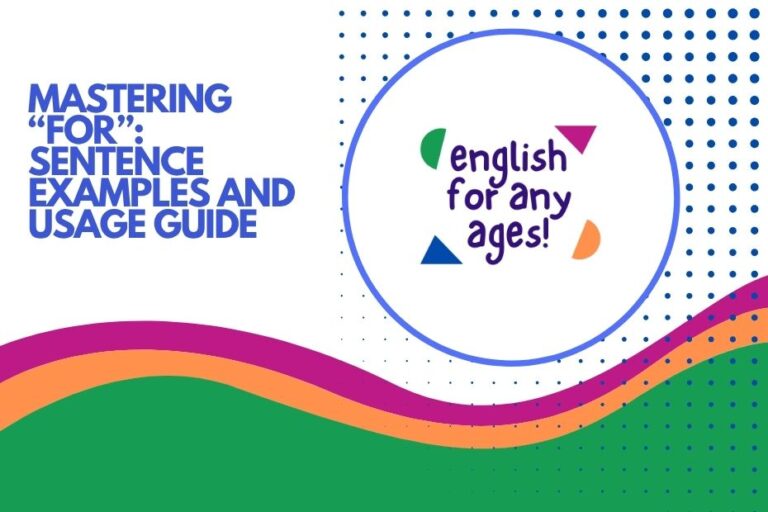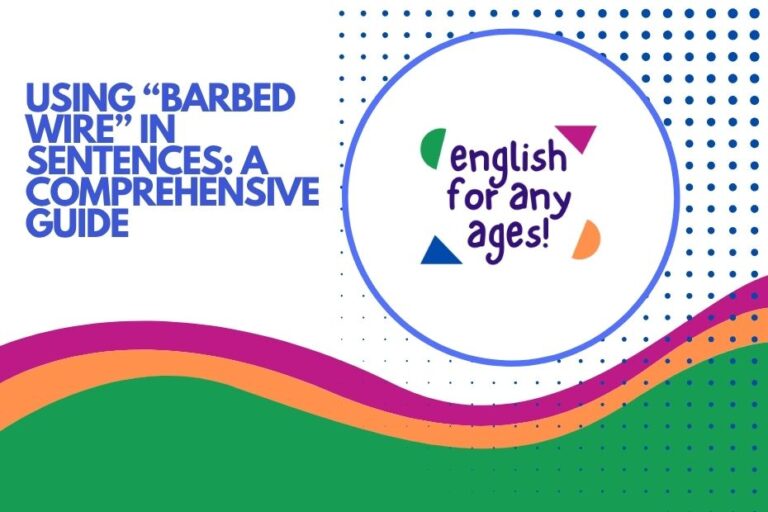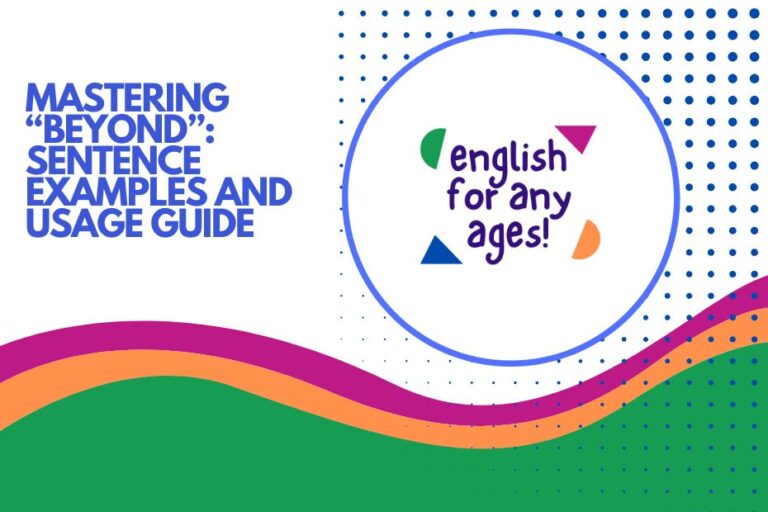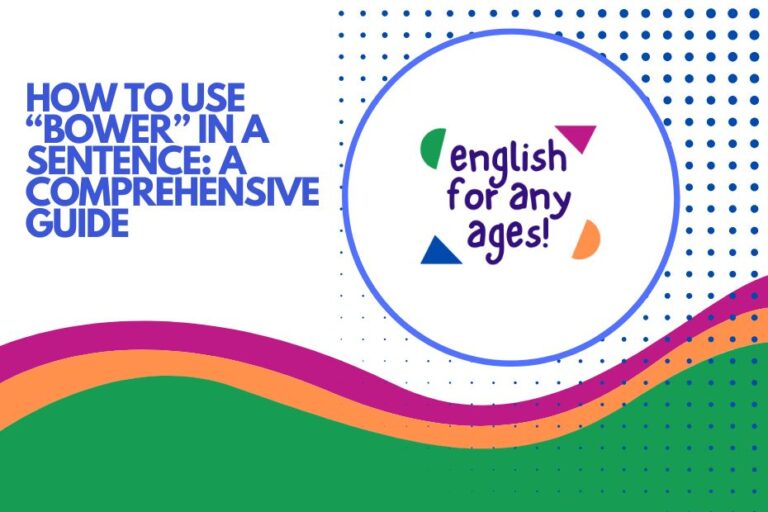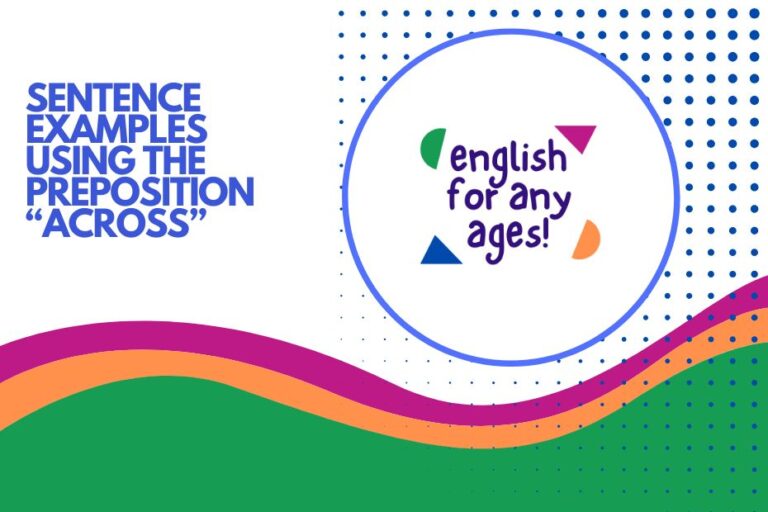Mastering ‘Except’: Sentence Examples and Usage Guide
Understanding how to use the preposition “except” correctly is crucial for clear and precise communication in English. “Except” allows us to specify exclusions, exceptions, or limitations to a general statement.
This article provides a comprehensive guide to using “except,” complete with definitions, structural breakdowns, various applications, and numerous examples. Whether you’re a beginner or an advanced learner, this guide will help you master the nuances of “except” and avoid common mistakes in your writing and speech.
This will be useful for ESL/EFL learners, students preparing for English language proficiency tests, and anyone looking to refine their grammar skills.
Table of Contents
- Definition of “Except”
- Structural Breakdown
- Types and Categories of “Except” Usage
- Examples of “Except” in Sentences
- Usage Rules for “Except”
- Common Mistakes with “Except”
- Practice Exercises
- Advanced Topics
- Frequently Asked Questions
- Conclusion
Definition of “Except”
The preposition “except” is used to indicate an exclusion or exception to a general statement. It specifies what or whom is not included in a larger group or action. In essence, it highlights a deviation from what is generally true or expected. “Except” is essential for adding precision to your sentences, allowing you to make broad claims while acknowledging specific exceptions.
Classification: Preposition
Function: To introduce an exception or exclusion.
Contexts: “Except” is used in various contexts, including:
- General statements with specific exclusions
- Rules and regulations with specific exceptions
- Descriptions of groups or collections with specific omissions
- Statements of preference or desire with specific aversions
Structural Breakdown
The basic structure using “except” involves a general statement followed by “except” and the specific exception. Understanding this structure is key to using “except” correctly and effectively.
General Structure:
[General Statement] + except + [Exception]
Let’s break down a sample sentence:
“Everyone enjoyed the party except John.”
In this sentence:
- General Statement: Everyone enjoyed the party.
- Preposition: except
- Exception: John
The exception can be a noun, a noun phrase, a pronoun, or even a clause, depending on the complexity of the sentence. The key is that the exception clearly identifies what is not included in the initial general statement. Understanding this core pattern allows for flexible and accurate usage of “except” in various contexts.
Types and Categories of “Except” Usage
While the basic function of “except” remains the same, its usage can vary slightly depending on the type of exception being specified. Here are some common categories:
1. Noun/Pronoun Exceptions
This is the most straightforward usage, where “except” is followed by a noun or pronoun indicating the exception.
Example: All students passed the exam except him.
2. Phrase Exceptions
Here, “except” is followed by a phrase, often a prepositional phrase, that further clarifies the exception.
Example: The store is open every day except Sunday.
3. Clause Exceptions
In more complex sentences, “except” can be followed by a clause, usually introduced by “that” or “when,” to provide a detailed exception.
Example: I like all kinds of music except when it’s too loud.
4. “Except for”
This is a common variation that is often interchangeable with “except,” but can sometimes emphasize the significance of the exception.
Example: The presentation was perfect except for a few minor typos.
5. “Except if”
This construction introduces a conditional exception. The action or statement is true unless a specific condition is met.
Example: You can go out, except if you haven’t finished your homework.
Examples of “Except” in Sentences
The best way to understand “except” is to see it in action. The following tables provide numerous examples, categorized by usage type, to illustrate how “except” can be used effectively in different contexts.
Table 1: Noun/Pronoun Exceptions
This table demonstrates the use of “except” followed by a noun or pronoun, clearly indicating the excluded element.
| Sentence | Exception |
|---|---|
| Everyone enjoyed the movie except Sarah. | Sarah |
| All the employees attended the meeting except him. | him |
| The children ate all their vegetables except the broccoli. | the broccoli |
| All the books were interesting except this one. | this one |
| Every guest arrived on time except her. | her |
| I like all fruits except bananas. | bananas |
| They invited everyone except John and Mary. | John and Mary |
| We visited all the museums except the art museum. | the art museum |
| She answered all the questions except the last one. | the last one |
| He completed all the tasks except cleaning the garage. | cleaning the garage |
| All the flowers bloomed except the roses. | the roses |
| Everyone understood the instructions except Peter. | Peter |
| I’ve seen all the movies except the new release. | the new release |
| They ate all the cookies except the chocolate ones. | the chocolate ones |
| All the birds flew south except the robin. | the robin |
| The entire team was present except for the captain. | the captain |
| All the students passed the test except for one. | one |
| I like all kinds of cheese except blue cheese. | blue cheese |
| All the lights were on except the kitchen light. | the kitchen light |
| Every animal in the zoo was awake except the lions. | the lions |
| The entire family went on vacation except my grandfather. | my grandfather |
| All the stores were open except the grocery store. | the grocery store |
| Everyone in the class finished the assignment except for Maria. | Maria |
| All the children received gifts except the youngest one. | the youngest one |
| Every member of the club attended the event except for David. | David |
| All the ingredients were fresh except the tomatoes. | the tomatoes |
| The whole office was decorated except my cubicle. | my cubicle |
| All the dishes were clean except the frying pan. | the frying pan |
| Every item on the menu was available except the lobster. | the lobster |
Table 2: Phrase Exceptions
This table illustrates the use of “except” followed by a phrase, which provides more context or detail about the exception.
| Sentence | Exception |
|---|---|
| The store is open every day except Sunday. | Sunday |
| I enjoy all outdoor activities except in the winter. | in the winter |
| The museum is free for everyone except on special event days. | on special event days |
| He eats everything except spicy food. | spicy food |
| She goes to the gym every day except when she’s traveling. | when she’s traveling |
| We visit our family every holiday except Thanksgiving. | Thanksgiving |
| They work every day except public holidays. | public holidays |
| I drink coffee every morning except on weekends. | on weekends |
| The library is open to everyone except during renovation. | during renovation |
| He likes all kinds of music except heavy metal. | heavy metal |
| She wears all colors except bright red. | bright red |
| We travel to Europe every year except for last year. | for last year |
| They eat all kinds of meat except pork. | pork |
| I read every night except when I’m too tired. | when I’m too tired |
| The park is open all the time except at night. | at night |
| She exercises regularly except when she is sick. | when she is sick |
| He attends all meetings except when they conflict with his schedule. | when they conflict with his schedule |
| We visit the beach every summer except during hurricane season. | during hurricane season |
| They play sports every weekend except when it rains. | when it rains |
| I study every evening except on Friday nights. | on Friday nights |
| The restaurant serves all meals except breakfast. | breakfast |
| She enjoys all genres of books except science fiction. | science fiction |
| He participates in all activities except the talent show. | the talent show |
| We support all local businesses except those with unethical practices. | those with unethical practices |
| They celebrate all holidays except April Fool’s Day. | April Fool’s Day |
| I watch all kinds of movies except horror films. | horror films |
| The museum showcases all types of art except modern installations. | modern installations |
| She listens to all radio stations except the talk radio station. | the talk radio station |
Table 3: Clause Exceptions
This table shows examples of “except” followed by a clause, providing a more detailed and conditional exception.
| Sentence | Exception |
|---|---|
| I like all kinds of music except when it’s too loud. | when it’s too loud |
| She enjoys all her classes except when there’s a pop quiz. | when there’s a pop quiz |
| They visit their grandparents every year except when they are traveling abroad. | when they are traveling abroad |
| He eats everything except that one particular dish. | that one particular dish |
| We go to the park every weekend except when the weather is bad. | when the weather is bad |
| They attend all the meetings except when they have prior commitments. | when they have prior commitments |
| I read every night except when I’m extremely tired. | when I’m extremely tired |
| She exercises regularly except when she feels unwell. | when she feels unwell |
| He helps everyone except when he’s overwhelmed with his own work. | when he’s overwhelmed with his own work |
| We celebrate all holidays except when we can’t be together. | when we can’t be together |
| They play video games every evening except when they have homework. | when they have homework |
| I drink coffee every morning except when I’m trying to cut back on caffeine. | when I’m trying to cut back on caffeine |
| She watches TV every night except when she has a book to read. | when she has a book to read |
| He cooks dinner every night except when his wife is home. | when his wife is home |
| We go swimming every summer except when the pool is closed. | when the pool is closed |
| They go hiking every weekend except when it’s too hot. | when it’s too hot |
| I listen to music every day except when I need complete silence. | when I need complete silence |
| She writes in her journal every night except when she’s too exhausted. | when she’s too exhausted |
| He practices the piano every day except when he’s traveling. | when he’s traveling |
| We visit our neighbors every week except when we’re out of town. | when we’re out of town |
| They invite all their friends except when they’re having a private party. | when they’re having a private party |
| I bake cookies every month except when I’m on a diet. | when I’m on a diet |
| She knits scarves every winter except when she runs out of yarn. | when she runs out of yarn |
| He builds models every year except when he’s too busy with work. | when he’s too busy with work |
| We plant flowers every spring except when there’s a late frost. | when there’s a late frost |
Table 4: “Except for” Usage
This table highlights the use of the phrase “except for,” which is often interchangeable with “except” but can sometimes add emphasis.
| Sentence | Exception |
|---|---|
| The presentation was perfect except for a few minor typos. | a few minor typos |
| The house was clean except for the messy bedroom. | the messy bedroom |
| The meal was delicious except for the overcooked vegetables. | the overcooked vegetables |
| The movie was great except for the ending. | the ending |
| The trip was enjoyable except for the delayed flight. | the delayed flight |
| The concert was amazing except for the poor sound quality. | the poor sound quality |
| The party was fun except for the loud music. | the loud music |
| The book was well-written except for the slow start. | the slow start |
| The game was exciting except for the controversial call. | the controversial call |
| The performance was flawless except for a slight stumble. | a slight stumble |
| The weather was beautiful except for the strong wind. | the strong wind |
| The car was in excellent condition except for a small scratch. | a small scratch |
| The garden was thriving except for the wilted roses. | the wilted roses |
| The cake was beautifully decorated except for the uneven frosting. | the uneven frosting |
| The project was completed on time except for one missing document. | one missing document |
| The essay was well-researched except for a few outdated sources. | a few outdated sources |
| The software was working perfectly except for a minor bug. | a minor bug |
| The painting was stunning except for a small imperfection. | a small imperfection |
| The experiment was successful except for one unexpected outcome. | one unexpected outcome |
| The speech was inspiring except for a few awkward pauses. | a few awkward pauses |
| The entire team worked hard except for a few slackers. | a few slackers |
| The whole room was clean except for a pile of clothes. | a pile of clothes |
| Every item was accounted for except for a missing key. | a missing key |
| All the ingredients were fresh except for a bruised apple. | a bruised apple |
| The whole process was smooth except for a slight delay. | a slight delay |
Table 5: “Except if” Usage
This table shows examples of “except if” usage, highlighting conditional exceptions.
| Sentence | Condition |
|---|---|
| You can go out, except if you haven’t finished your homework. | you haven’t finished your homework |
| You can have dessert, except if you didn’t eat your vegetables. | you didn’t eat your vegetables |
| You can borrow my car, except if you promise to be careful. | you promise to be careful |
| You can watch TV, except if you have chores to do. | you have chores to do |
| You can play video games, except if you neglect your studies. | you neglect your studies |
| You can use my laptop, except if you download suspicious files. | you download suspicious files |
| You can stay up late, except if you have an early morning. | you have an early morning |
| You can invite friends over, except if you clean up afterwards. | you clean up afterwards |
| You can eat the cake, except if you saved some for later. | you saved some for later |
| You can listen to music, except if you disturb the neighbors. | you disturb the neighbors |
| You can wear that shirt, except if it’s dirty. | it’s dirty |
| You can take a break, except if you have an urgent task. | you have an urgent task |
| You can skip the meeting, except if your presence is required. | your presence is required |
| You can ignore the email, except if it’s from your boss. | it’s from your boss |
| You can decline the invitation, except if it’s important to the host. | it’s important to the host |
| You can postpone the project, except if the deadline is approaching. | the deadline is approaching |
| You can cancel the appointment, except if it’s crucial for your health. | it’s crucial for your health |
| You can avoid the party, except if your friends will be disappointed. | your friends will be disappointed |
| You can ignore the advice, except if it’s coming from an expert. | it’s coming from an expert |
| You can disregard the warning, except if it’s based on factual evidence. | it’s based on factual evidence |
| You can disagree with the decision, except if it’s already been finalized. | it’s already been finalized |
| You can challenge the rule, except if it’s designed to protect safety. | it’s designed to protect safety |
| You can question the policy, except if it’s based on ethical principles. | it’s based on ethical principles |
| You can doubt the information, except if it’s from a reliable source. | it’s from a reliable source |
Usage Rules for “Except”
While “except” is generally straightforward, there are some specific rules to keep in mind for correct usage:
- Placement: “Except” typically comes after the general statement and before the exception.
- Clarity: Ensure the exception is clearly defined and easily understood. Ambiguity can lead to confusion.
- “Except for” vs. “Except”: While often interchangeable, “except for” can sometimes emphasize the significance of the exception. Use it when you want to draw particular attention to the excluded element.
- Subject-Verb Agreement: Ensure the verb in the main clause agrees with its subject, even with the exception in mind. For example: “Everyone *is* happy, except John.” (The verb “is” agrees with “everyone,” not “John.”)
- Avoid Double Negatives: Be careful not to create double negatives when using “except.” For instance, avoid phrases like “not everyone except…” as they can be confusing.
Common Mistakes with “Except”
Even experienced English speakers sometimes make mistakes with “except.” Here are some common errors and how to avoid them:
| Incorrect | Correct | Explanation |
|---|---|---|
| Everyone like pizza except I. | Everyone likes pizza except me. | Use the objective pronoun “me” after “except.” |
| I don’t like no vegetables except carrots. | I don’t like any vegetables except carrots. or I like all vegetables except carrots. | Avoid double negatives. |
| All the students is here except him. | All the students are here except him. | Ensure subject-verb agreement. “All the students” is plural, so use “are.” |
| Except, I like chocolate. | I like everything except chocolate. | “Except” should follow the general statement, not start the sentence. |
| Everyone went to the party, expect John. | Everyone went to the party, except John. | “Expect” (to anticipate) is different from “except” (to exclude). |
| All of us except for me went to the store. | All of us except me went to the store. | “Except for me” is redundant in this context; “except me” is sufficient. |
| I enjoy all sports, but except swimming. | I enjoy all sports, except swimming. | “But” is unnecessary when using “except.” |
| Everyone came on time, except for being late. | Everyone came on time, except for John being late. | Clarify who or what is the exception. |
Practice Exercises
Test your understanding of “except” with these practice exercises. Fill in the blanks with the correct use of “except” or “except for.”
Exercise 1: Fill in the Blanks
Complete the following sentences using “except” or “except for.”
| Question | Answer |
|---|---|
| 1. I eat all kinds of fruit _______ apples. | except |
| 2. The entire team played well _______ one mistake. | except for |
| 3. She enjoys all her classes _______ math. | except |
| 4. He goes to the gym every day _______ Sundays. | except |
| 5. We visited all the museums _______ the modern art museum. | except |
| 6. The house was clean _______ the attic. | except for |
| 7. They invited everyone _______ me. | except |
| 8. I like all kinds of music _______ heavy metal. | except |
| 9. The weather was perfect _______ the strong wind. | except for |
| 10. All the students passed the test _______ him. | except |
Exercise 2: Sentence Completion
Complete the following sentences using “except if” and a suitable condition.
| Question | Answer |
|---|---|
| 1. You can have a cookie, _______ . | except if you haven’t eaten your dinner. |
| 2. You can borrow my book, _______ . | except if you promise to return it soon. |
| 3. You can watch TV, _______ . | except if you have homework to do. |
| 4. You can go to the party, _______ . | except if you have other important commitments. |
| 5. You can use my car, _______ . | except if you are not a licensed driver. |
| 6. You can stay up late, _______ . | except if you have to wake up early tomorrow. |
| 7. You can eat this candy, _______ . | except if you have a dentist appointment next week. |
| 8. You can play video games, _______ . | except if you don’t finish your chores first. |
| 9. You can go to the concert, _______ . | except if you have to study for your exams. |
| 10. You can attend the event, _______ . | except if you are feeling unwell. |
Exercise 3: Error Correction
Identify and correct the errors in the following sentences.
| Question | Answer |
|---|---|
| 1. Everyone like ice cream except I. | Everyone likes ice cream except me. |
| 2. I don’t like no vegetables except broccoli. | I don’t like any vegetables except broccoli. / I like all vegetables except broccoli. |
| 3. All the students is present except him. | All the students are present except him. |
| 4. Except, I enjoy reading books. | I enjoy everything except reading books. |
| 5. Everyone went to the beach, expect Sarah. | Everyone went to the beach, except Sarah. |
| 6. All of us except for me enjoyed the movie. | All of us except me enjoyed the movie. |
| 7. I love all genres of music, but except classical. | I love all genres of music, except classical. |
| 8. The whole team performed well, except for being tired. | The whole team performed well, except for John being tired. |
| 9. You can have all the cake except if you share it. | You can have all the cake except if you don’t share it. |
| 10. The restaurant is open every day expect Monday. | The restaurant is open every day except Monday. |
Advanced Topics
For advanced learners, there are some more nuanced aspects of using “except” to consider:
- Formal vs. Informal Usage: While “except” and “except for” are often interchangeable, “except for” can sometimes sound more formal.
- “Other Than”: “Other than” is a similar preposition that can often be used in place of “except.” However, “other than” can sometimes imply a greater degree of difference or separation.
- “Apart From”: “Apart from” is another synonym for “except,” and it can sometimes imply a more significant exception.
- Elliptical Clauses: In some cases, the clause following “except” can be elliptical (missing words) if the meaning is clear from the context. For example: “I like all sports except swimming” (where “except” implies “except for swimming”).
- “But”: While “but” is a conjunction, it can sometimes function similarly to “except” when introducing an exception. However, “but” typically connects two independent clauses, while “except” introduces a prepositional phrase or dependent clause.
Frequently Asked Questions
Here are some common questions about using “except”:
- Is there a difference between “except” and “except for”?
In many cases, “except” and “except for” are interchangeable. However, “except for” can sometimes emphasize the exception more strongly. Use “except for” when you want to draw particular attention to the excluded element. For instance, “The room was clean except for the dusty shelves” highlights the dusty shelves as a significant exception.
- Can “except” be used at the beginning of a sentence?
No, “except” should not be used at the beginning of a sentence. It should follow the general statement to introduce the exception. For example, instead of “Except John, everyone enjoyed the party,” say “Everyone enjoyed the party except John.”
- What pronoun case should I use after “except”?
Use the objective pronoun case (me, him, her, us, them) after “except.” For example, “Everyone invited except her attended the event.”
- How do I avoid double negatives with “except”?
Be careful not to use “except” with negative words like “no” or “not” in a way that creates a double negative. Instead of “I don’t like no vegetables except carrots,” say “I don’t like any vegetables except carrots” or “I like all vegetables except carrots.”
- Can I use “except” with a verb?
Yes, you can use “except” with a verb, often in the form of a gerund (verb + -ing). For example, “He enjoys all activities except swimming.”
- What’s the difference between “except” and “besides”?
“Except” means ‘not including,’ while “besides” means ‘in addition to.’ “Except” indicates an exclusion, while “besides” indicates an inclusion. For example, “Everyone except John went to the store” means John didn’t go, while “Everyone besides John went to the store” means John also went.
- Can I use “except” to introduce a clause?
Yes, you can use “except” to introduce a clause, often using “except when” or “except that.” For example, “I enjoy all kinds of music except when it’s too loud.”
- How does “except” compare to “excluding”?
“Except” and “excluding” are similar in meaning, both indicating an exclusion. However, “excluding” is typically used as a preposition or part of a prepositional phrase, while “except” can also function as a conjunction. For instance, “Everyone except John attended” is similar to “Everyone, excluding John, attended.”
Conclusion
Mastering the use of “except” is essential for precise and effective communication in English. This article has provided a comprehensive guide to understanding and using “except” correctly, covering its definition, structure, usage rules, common mistakes, and


